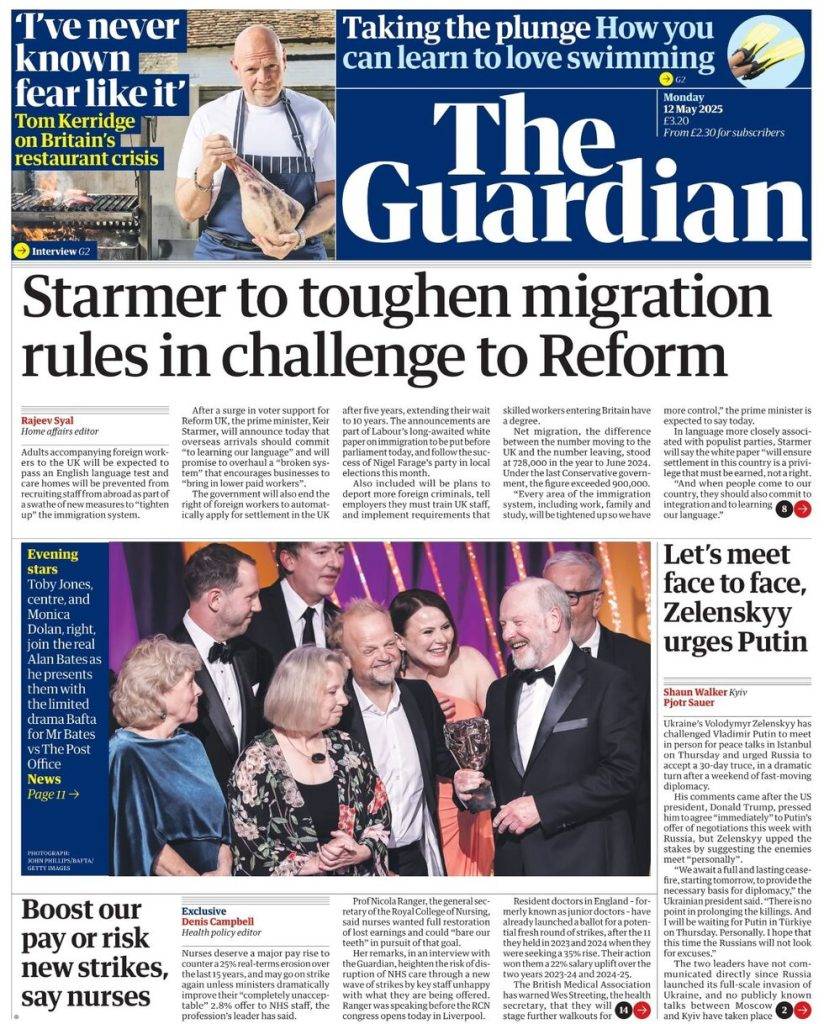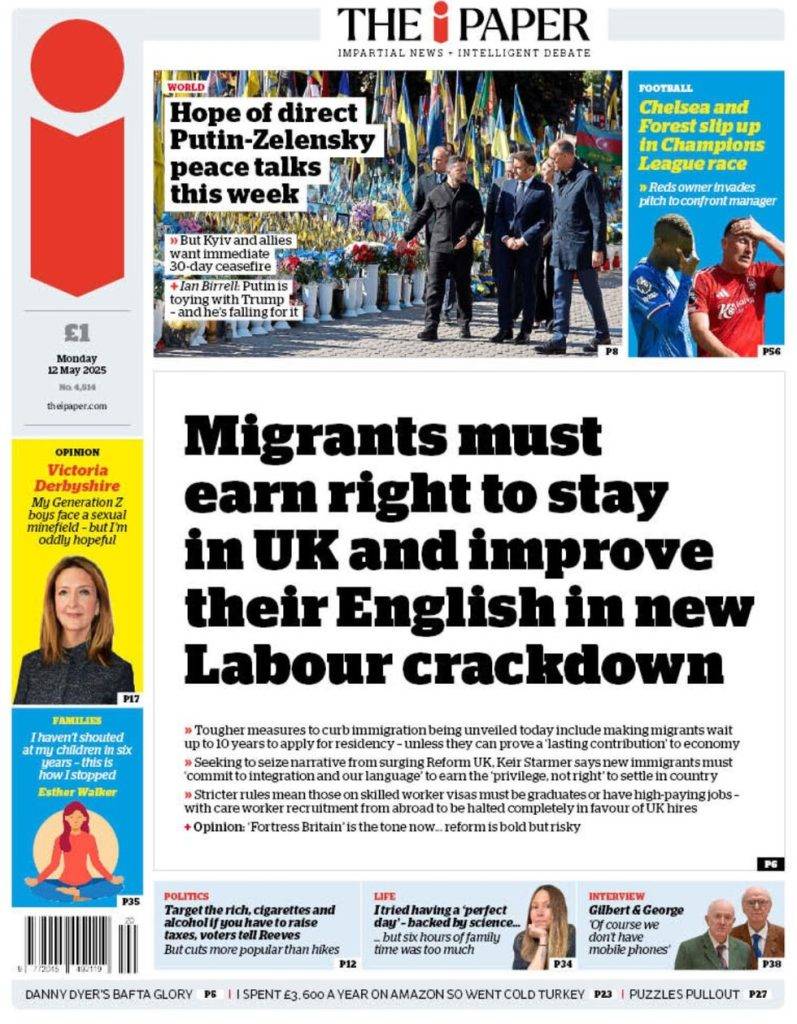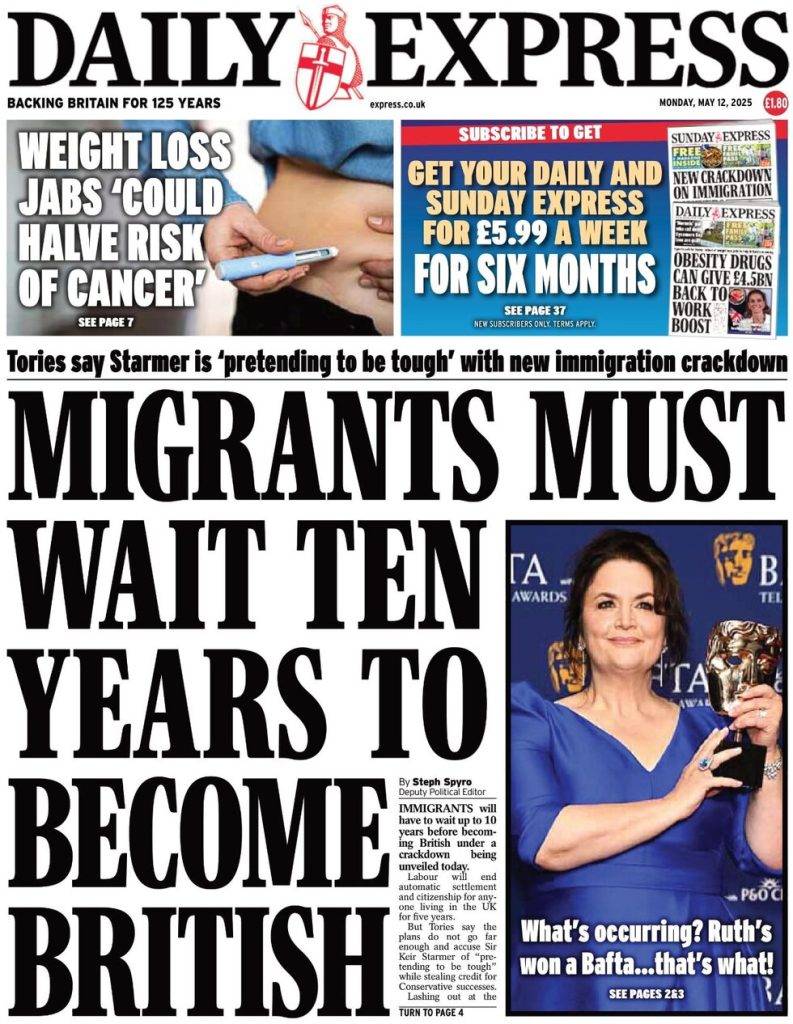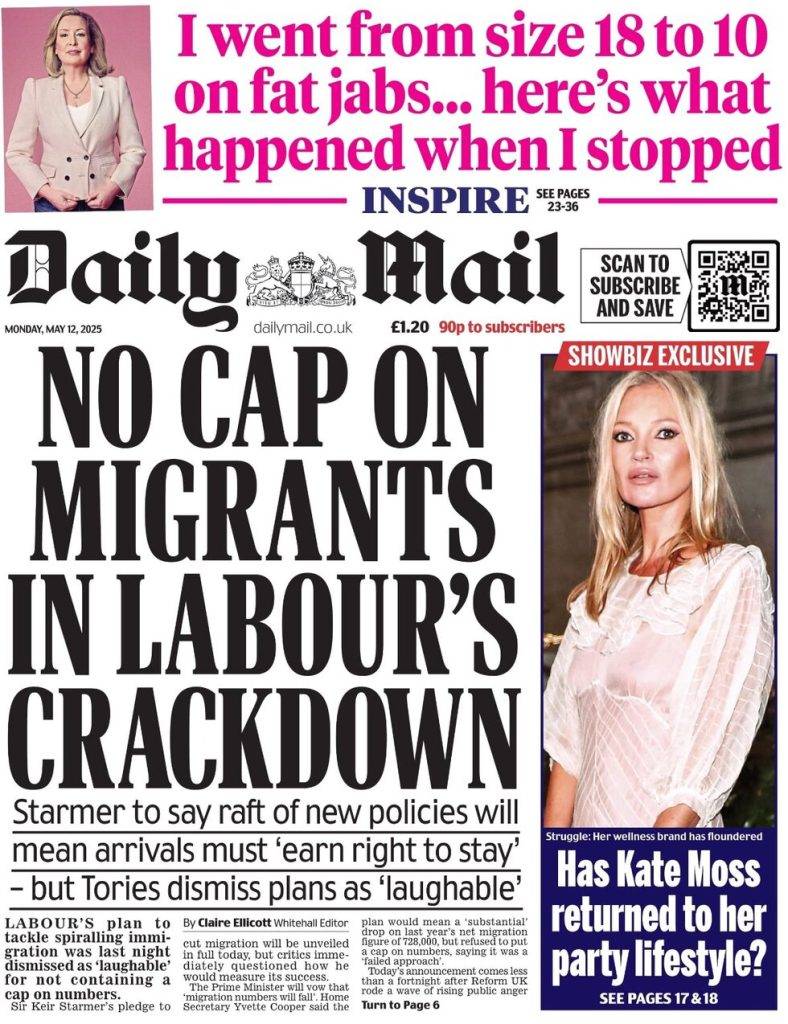- Today’s Football Fixtures| PL| Seria A| La Liga & more
- Starmer Cancels Council Election Delay: What This Means for Voters
- Man Utd urged to complete £100m transfer move ahead of Arsenal
- German Finance Minister Lars Klingbeil urges swift advancement of digital euro
- Man Utd told to avoid ‘big Michael Carrick mistake’ after double manager blow
- Danish PM Mette Frederiksen reiterates Trump’s serious interest in Greenland
- Teens convicted of murdering man by luring him to beach and throwing rocks
- UK Weather Alert: Heavy snow, ice, and flooding expected this week
PM to toughen migration rules in crackdown to defeat rise of Reform | Paper Talk UK
Bias Exposure
PM to toughen migration rules in crackdown to defeat rise of Reform
Many of the UK newspapers lead with today’s announcement of new changes to Britain’s immigration system – in what most papers agree is an attempt to stump the rise of Reform UK. It comes after Labour lost hugely to Reform in England’s local elections.
The newspapers had already gone to print before the official announcement, but they had previews of the prime minister’s speech – and what his reforms are set to look like.
The PM has promised every area of the system “will be tightened up so we have more control.”
Changes will include tightening English tests and cutting the recruitment of overseas care workers – something care home bosses have already described as ‘crushing’.
Opposition parties have been calling for big changes to immigration saying both legal and illegal immigration is hurting the country. The number of people coming into the country, minus the number leaving hit 728,000 in the year to June 2024.
Labour is attempting to overhaul an issue that has been prominent in the country for decades – one that even the Tories have admitted they got wrong, in failing to stem the flow of immigration.
It’s not clear how it will impact the economy – but in terms of politics, it will be a move widely celebrated by the Red Wall (who are turning to Reform in mass numbers).
The Guardian says the prime minister is toughening rules in what it calls a “challenge to Reform [UK]”, which swept the recent local elections in England. The paper says that adults such as spouses, siblings, parents and grown-up children who accompany foreign workers to the UK will be expected to pass an English language test, while care homes will not be allowed to hire staff from abroad.
EXPLAINER
The headline “Starmer to toughen migration rules in challenge to Reform” employs strategic framing to inject political drama and competitiveness into policy reporting. By using the phrase “toughen migration rules,” it taps into emotionally and politically charged discourse, suggesting a hardline shift that may alarm or appeal to different audiences.
The addition of “in challenge to Reform” frames the policy move as a reactionary tactic, turning governance into a political game and positioning Reform UK as a primary influence on Labour’s direction. This kind of headline simplifies complex policymaking into a gladiatorial narrative of rivalry and one-upmanship, prioritising spectacle over substance.

The i newspaper says “migrants must earn the right to stay … and improve their English.” The PM says new immigrants have to earn the “privilege, not right” to settle in the UK. The paper notes that it’s the government’s attempt to “seize the narrative from surging Reform UK.”
EXPLAINER
The headline “Migrants must earn right to stay in UK and improve their English in new Labour crackdown” uses loaded language and a confrontational tone to evoke strong public reactions. The phrase “earn right to stay” implies migrants are not inherently entitled to residence, framing them as needing to prove their worth, while “improve their English” reinforces cultural assimilation narratives.
The term “crackdown“ suggests harsh, punitive action, aligning the policy with disciplinary force rather than reform. This kind of phrasing positions migration as a threat or problem to be managed, appealing to populist sentiment and reducing complex human and legal issues to rigid, emotionally charged soundbites.

The Times says migrants will need to “earn their right to remain” with those who pay their taxes on time, work in the public sector or have high-skilled jobs, or volunteer in the community, being “prioritised for residency rights”. Shadow home secretary Chris Philip says it is a “joke” to say the plans will be tough on criminal migrants.
EXPLAINER
The headline “Migrants must earn their right to remain” is a stark and provocative formulation that uses authoritative and exclusionary language to frame migration as conditional and transactional. The use of “must earn” suggests migrants are inherently undeserving until proven otherwise, invoking notions of merit and worthiness that can stoke public hostility.
By reducing the issue to a single, imperative statement, the headline strips away any nuance around asylum, international law, or human dignity, instead presenting migration as something to be policed or restricted. This tactic taps into divisive rhetoric, prioritising impact and ideological signalling over balanced discourse.

The Daily Express says migrants will need to wait 10 years to “become British” in what the paper calls a “crackdown”. It says that automatic settlement and citizenship for anyone living in the UK for five years will also end. The paper speaks to Tories who say the government is “pretending to be tough” on the issue.
EXPLAINER
The headline “Migrants must wait ten years to become British” employs a declarative and exclusionary tone that frames citizenship as a distant and heavily conditional reward. The emphasis on the duration—“ten years”—serves to underline restriction and delay, subtly reinforcing the notion that becoming “British” is a privilege reluctantly granted rather than an inclusive or integrative process.
This kind of headline simplifies complex naturalisation policies into a punitive-sounding soundbite, fuelling narratives of deterrence and control. It caters to public anxieties over immigration by casting the path to belonging as something to be delayed and tightly regulated, rather than understood in its legal, social, and human context.

The Daily Mail leads on the Conservative response saying Tories call the plans “laughable” for not including a cap on numbers. The paper adds that critics have questioned how success will be measured. The paper – reporting from the other side – notes the prime minister has vowed that “migration numbers will fall.”
EXPLAINER
The headline “No cap on migrants in Labour’s crackdown” is a contradictory and provocative formulation that plays on public expectations and political tension. The term “crackdown” implies strict control or restriction, typically associated with reducing numbers or enforcing limits. However, pairing it with “no cap on migrants” creates a jarring juxtaposition, suggesting inconsistency or even hypocrisy in policy.
This dissonance is likely intentional, designed to stir confusion or outrage by implying that Labour’s measures are tough in rhetoric but lenient in practice. It exploits emotional reactions to migration and policy ambiguity, reducing complex governance decisions to a punchy, polarising headline.

The Daily Telegraph reports that the prime minister is proposing to “shut the ECHR migrant loophole” as part of the wide-ranging proposals to cut the migration numbers. The paper says the white paper will “tighten legislation” that currently allows courts to grant asylum to what it calls “foreign criminals and illegal migrants” under the ECHR.
EXPLAINER
The headline “Starmer to shut ECHR migrant loophole” uses assertive and combative language to project a tough stance on migration while invoking broader political and legal tensions.
The phrase “shut loophole” implies the European Convention on Human Rights is being exploited, framing it as a weakness in the system rather than a safeguard of individual rights. By linking Starmer directly to this action, the headline casts him as taking control, possibly to appeal to voters favouring stricter immigration measures.
This tactic reduces a complex legal and ethical debate into a simplistic narrative of enforcement versus exploitation, playing into populist sentiments and reinforcing adversarial views of international legal frameworks.

Subscribe to Updates
Get the latest creative news from FooBar about art, design and business.

